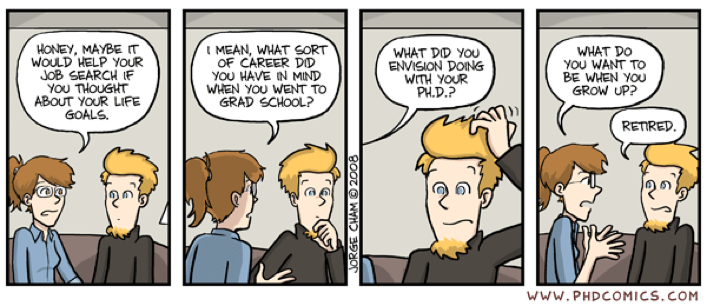 The following is an article review of “Research your career options well before graduation” by Beryl Lieff Benderly. Scientists are well trained “to not only collect useful career planning information but also … to reflect on what [they] find and apply it to [their] choices.”- ReSearch: A career guide for Scientists. One of the many concerns Ph.D. students have is finding a job after graduation. We have always heard that if one decides to a get a Ph.D. it is to go into an academic career, however, this is not the current reality. We have many options besides academia. Many students do not feel comfortable discussing career paths outside of academia to their mentors, but we have reached a time whereby there are not enough academic jobs for every Ph.D. graduate. There are a range of other areas to apply your trainingsuch as a pharma or biotechnology company, medical affairs, medical writing, law, and regulatory writing. There are many job opportunities for Ph.D graduates out there, but it is really important to research these options and keep an open mind. Beryl Lieff Benderley, a Science Careers writer, reviews the book ReSearch (Evans, Lundteen, and Vanderford, 2017); this book discusses the transition process of going from a Ph.D. student to a career professional andhe questions that need to be addressed before starting the process of career hunting. Beryl begins her review by noting that from the moment we start graduate school, it is necessary to set a plan to identify your strong and weak skills- such as bench or writing skills- in order to be able to identify a career path suitable for you. Waiting to do this until the last few weeks of your graduate career could add to the stress of research life. To structure your post-graduation planning, Beryl discusses four steps to build one’s career: 1) identify your interests and skills, 2) learn about the job market and understand necessary skills requirements, 3) take the steps to fill in knowledge and skill gaps for that particular career, and 4) identify employers or job openings that you would like to apply for and prepare the necessary documents. If you are not sure on how to start this process, you should ask for guidance from your peers, mentor, or any other professor. Another point Beryl discusses in her article is knowing when to send the right document to highlight your skills, the resume or the curriculum vitae (CV). CVs tend to be lengthy while resumes go straight to the point and show your interests and best features suited for a quick glance. Also, showing relevant experiences to the position you are looking for is important. So then, how does one get that “relevant experience”? She mentions that volunteer work, internships, outreach programs, and some fellowships are a great opportunity for this. Make sure toresearch all the options you have to build up your resume before graduating. Lastly, Beryl stresses that while researching career paths outside of academia can be tiring and frustrating, one should not lose confidence and stamina during the process. Always keep a positive attitude! Thankfully, Rutgers has the iJOBs program which helps their graduate and post-doctoral students to maneuver their way around the job hunt process. There are events on how to build a resume and a CV, career panels with current professionals in non-academic positions, and workshops on how to prepare for the job market. So where can you go from here? Make a plan and take advantage of the resources and tools Rutgers has to offer! It isn’t only about becoming an expert in your research area, it is also about learning and understanding the skills, experiences, and expertise that will drive your future career.
The following is an article review of “Research your career options well before graduation” by Beryl Lieff Benderly. Scientists are well trained “to not only collect useful career planning information but also … to reflect on what [they] find and apply it to [their] choices.”- ReSearch: A career guide for Scientists. One of the many concerns Ph.D. students have is finding a job after graduation. We have always heard that if one decides to a get a Ph.D. it is to go into an academic career, however, this is not the current reality. We have many options besides academia. Many students do not feel comfortable discussing career paths outside of academia to their mentors, but we have reached a time whereby there are not enough academic jobs for every Ph.D. graduate. There are a range of other areas to apply your trainingsuch as a pharma or biotechnology company, medical affairs, medical writing, law, and regulatory writing. There are many job opportunities for Ph.D graduates out there, but it is really important to research these options and keep an open mind. Beryl Lieff Benderley, a Science Careers writer, reviews the book ReSearch (Evans, Lundteen, and Vanderford, 2017); this book discusses the transition process of going from a Ph.D. student to a career professional andhe questions that need to be addressed before starting the process of career hunting. Beryl begins her review by noting that from the moment we start graduate school, it is necessary to set a plan to identify your strong and weak skills- such as bench or writing skills- in order to be able to identify a career path suitable for you. Waiting to do this until the last few weeks of your graduate career could add to the stress of research life. To structure your post-graduation planning, Beryl discusses four steps to build one’s career: 1) identify your interests and skills, 2) learn about the job market and understand necessary skills requirements, 3) take the steps to fill in knowledge and skill gaps for that particular career, and 4) identify employers or job openings that you would like to apply for and prepare the necessary documents. If you are not sure on how to start this process, you should ask for guidance from your peers, mentor, or any other professor. Another point Beryl discusses in her article is knowing when to send the right document to highlight your skills, the resume or the curriculum vitae (CV). CVs tend to be lengthy while resumes go straight to the point and show your interests and best features suited for a quick glance. Also, showing relevant experiences to the position you are looking for is important. So then, how does one get that “relevant experience”? She mentions that volunteer work, internships, outreach programs, and some fellowships are a great opportunity for this. Make sure toresearch all the options you have to build up your resume before graduating. Lastly, Beryl stresses that while researching career paths outside of academia can be tiring and frustrating, one should not lose confidence and stamina during the process. Always keep a positive attitude! Thankfully, Rutgers has the iJOBs program which helps their graduate and post-doctoral students to maneuver their way around the job hunt process. There are events on how to build a resume and a CV, career panels with current professionals in non-academic positions, and workshops on how to prepare for the job market. So where can you go from here? Make a plan and take advantage of the resources and tools Rutgers has to offer! It isn’t only about becoming an expert in your research area, it is also about learning and understanding the skills, experiences, and expertise that will drive your future career. 
iJOBS Blog